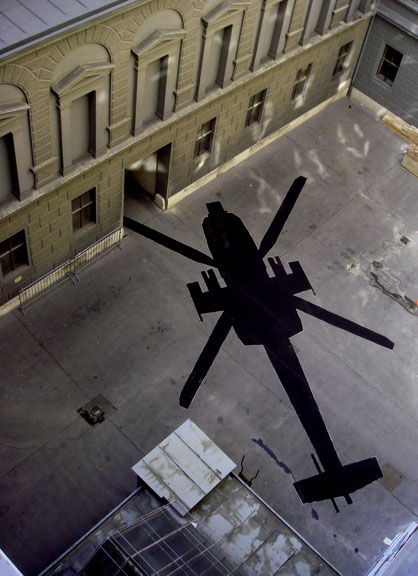Issue 4/2008 - Net section
Keeping Vienna safe, sure thing!
The »Global Security Alliance« discussing the »new security culture« in Vienna
When people refer to a »new security culture« in this context, it has nothing to do with the Austrian election campaign in September 2008 and how it circled around the ineffable topic of »security« – in one of the safest cities in the world. Participants in the forum held at the »World Security Days« in May 2008 were more concerned with the question of the extent to which the fiction of scenarios of menace, secret service vocabulary, conspiracy theories and art production feed into each other and hence legitimise violation of a range of standards privacy standards under the mantle of global security. In comparison, in the early 1980s, back when the slogan »1984 – Big Brother is watching you« was scrawled on the walls of many houses in Vienna and activists began to spray paint over cameras on the underground, notions of surveillance were relatively naive, yet the line separating a society of discipline from a society predicated on control had already been crossed.
Konrad Becker, in his capacity as a representative of the »Global Security Alliance« (G.S.A.), explains that in the wake of the paradigm of the global war on terror, the future of art lies in the security sphere, particularly in the context of the ideology of the creative industries, whereby on the one hand artists supply the industry, whilst on the other hand this provides them with the »security« of being part of the whole. »There is a need for a precise (philosophical) analysis of where security ends and insecurity begins«, to cite Brian Holmes, who bases his argument on the writer Jack Burnham and summarises: »The job for art and cultural critiques nowadays is to create a space within democratic societies for the requisite fictions, satires, dual identities, along with shadow-boxing within aesthetic systems.«
As part of the Security Days and parallel to the conference as such, G.S.A., in conjunction with KÖR (the acronym stands for Kunst im öffentlichen Raum Wien/Art in Public Space Vienna) also organised »Security Screenings«, a peace concert by »Psyops Soundsystem« as well as a free party. The project »23 geo-psychological interventions« was dreamt up but proved impossible to implement: the idea involved helicopter shadow-painting visible from space in »strategic security-relevant or surveillance-relevant« squares in Vienna such as Viktor-Adler-Platz, around the Millennium Tower on Handelskai and on Heldenplatz. The authorities in Vienna’s City Hall substantiated their decision not to allow the project by stating that what was dubbed the »Black Helicopter«, painted with black water-colour paint, would be a public security thereat. Does anyone still remember the re-enacted bombing night on 12th March 2005, created by »Die Zukunft der Vergangenheit« (»The Future of the Past«) and featuring: searchlights, sirens, the sound of detonations and bright-red »hit« signs?
»This is certainly not wargaming«, those in charge said back then. Literature theorist Eva Horn described in her lecture at the conference how secret service know-how is worked into feature films (Hollywood productions) and, conversely, how films serve the discourses of the intelligence services (such as the CIA), for example in portraying scenarios of global threat. »The basic tool for the manipulation of reality is the manipulation of words. If you can control the meaning of words, you can control the people who must use the words«, wrote American author Philip K. Dick. Military units use this knowledge in waging psychological warfare, adopting slogans such as »Win with Words« by way of identification. Here words become weapons and what is at stake in this war is the capacity to set the agenda, having the power to define concepts and control language as part of maintaining domination over information.
As a worldwide service provider, the »Global Security Alliance« offers a package comprising risk advisory services, experienced managers and global networks. The next conference is to examine the importance of search engines as tools to classify information. The alliance’s homepage already includes research findings, short films, soundscapes – and even one or two tracks to get your toes tapping.
http://global-security-alliance.com/
Translated by Helen Ferguson

